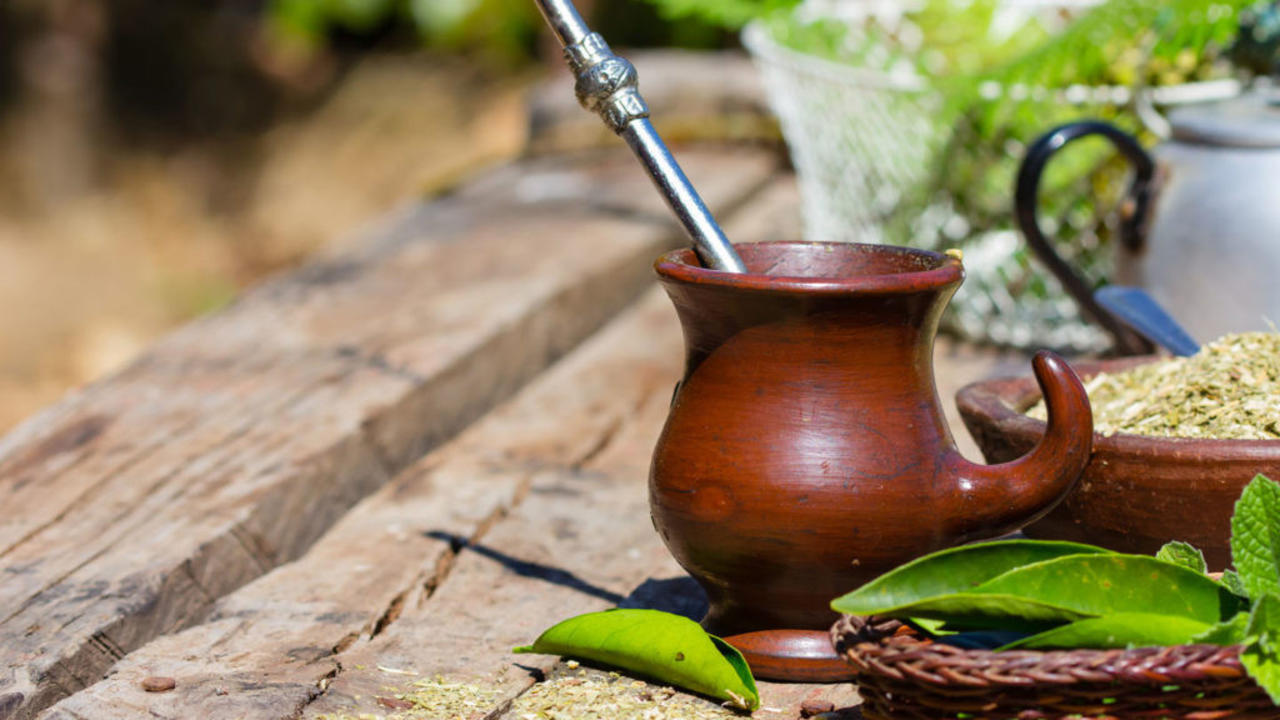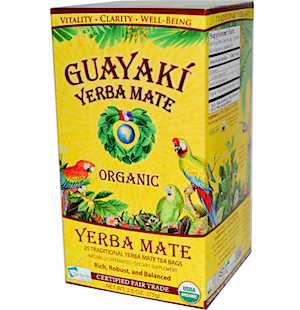Yerba Maté | healthy & powerful coffee substitute

5 reasons to try Yerba Maté today :
1. Does Yerba Maté contain antioxidants? YES!
The polyphenols and high antioxidant activity in Yerba Maté have powerful health benefits. These compounds strengthen your body’s natural defenses and protect against cellular degeneration and oxidative stress.1 Many studies show that the main antioxidant contained in Yerba Maté, called chlorogenic acid, is associated with a lower risk of inflammation and heart disease.2 The benefits don’t stop there. Yerba Maté also boasts minerals including potassium, magnesium and manganese which supports healthy joints.
2. Does Yerba Maté have immunity-boosting properties? YES!
There is evidence to support that the saponins in Yerba Maté have immunity-boosting and anti-parasitic properties.2 So, be sure to try it during the cold and flu season.
3. Does Yerba Maté support good digestion? YES!
Yerba Maté has traditionally been used as a digestive aid. When consumed, it stimulates your production of bile and other gastric acids3, resulting in healthy digestion and regular elimination – both important for detoxification.
4. Does Yerba Maté support cardiovascular health? YES!
The antioxidants and amino acids present in Yerba Maté have been proven to have a lipid-lowering effect. One trial with 102 volunteers found that after just over 1 month of consuming 1 cup per day, individuals with elevated levels of ‘bad’ cholesterol experienced an 8.6% reduction in low-density lipoprotein (LDL) levels and a 4.4% increase in ‘good’ cholesterol (high-density lipoprotein or HDL). Even more promising, participants who were already on cholesterol-lowering statin drugs witnessed a 13.1% reduction in LDL and a 6.3% increase in HDL.4 Yerba Maté also helps prevent arteriosclerosis (hardening of the arteries) and prevents blood clots that may cause heart attack or stroke.
5. Does Yerba Maté help control weight? YES!
Yerba Maté may act as a mild appetite suppressant! In addition to having beneficial effects on lipid metabolism and chronic diseases with inflammatory components, Yerba Maté may help you feel full sooner after you begin eating AND slow down your digestion so that you feel full longer.5 The stimulating chemical compounds in the tea may also help your body use carbohydrates more efficiently, giving you more energy from the food you eat. In other words, consuming Yerba Maté – alongside a healthy diet and regular exercise – could help boost your weight loss.6
2 important notes about Yerba Maté :
And 2 Yerba Maté sources I recommend :
-
Maté Factor is an organic Yerba Maté company based in Winnipeg, Manitoba, Canada. Click here for more information.
-
Guayaki is a high quality, organic Yerba Maté company based in California, USA. Click here for more information.
- Heck CI, de Mejia EG: “Yerba Maté Tea (Ilex paraguariensis): a comprehensive review on chemistry, health implications, and technological considerations.” J Food Sci. 2007 Nov;72(9):R138-51.
- Kellie P. Burris, Federico M. Harte, P. Michael Davidson, C. Neal Stewart, Jr., and Svetlana Zivanovic : “Composition and Bioactive Properties of Yerba Maté (llex paraguariensis A. St.-Hil.): A Review.” Chilean Journal of Agricultural Research 72(2) April - June 2012. On-line ISSN 0718-5839
- Filip R, Ferraro GE.: “Researching on new species of "Maté"." Ilex brevicuspis: phytochemical and pharmacology study.” Eur J Nutr. 2003 Jan;42(1):50-4.
- de Morais EC, Stefanuto A, Klein GA, Boaventura BC, de Andrade F, Wazlawik E, Di Pietro PF, Maraschin M, da Silva EL.: “Consumption of Yerba Maté ( Ilex paraguariensis ) improves serum lipid parameters in healthy dyslipidemic subjects and provides an additional LDL-cholesterol reduction in individuals on statin therapy.” JAgric Food Chem. 2009 Sep 23;57(18):8316-24. doi: 10.1021/jf901660g.
- Resende PE, Verza SG, Kaiser S, Gomes LF, Kucharski LC, Ortega GG.: “The activity of maté saponins (Ilex paraguariensis) in intra-abdominal and epididymal fat, and glucose oxidation in male Wistar rats.” J Ethnopharmacol. 2012 Dec 18;144(3):735-40. doi: 10.1016/j.jep.2012.10.023. Epub 2012 Oct 23.
- Hussein GM, Matsuda H, Nakamura S, Hamao M, Akiyama T, Tamura K, Yoshikawa M.: “Maté tea (Ilex paraguariensis) promotes satiety and body weight lowering in mice: involvement of glucagon-like peptide-1.” Biol Pharm Bull. 2011;34(12):1849-55.
- Bracesco N, Sanchez AG, Contreras V, Menini T, Gugliucci A.: “Recent advances on Ilex paraguariensis research: minireview.” J Ethnopharmacol. 2011 Jul 14;136(3):378-84. doi: 10.1016/j.jep.2010.06.032. Epub 2010 Jun 26.
- Dora Loria; Enrique Barrios; Roberto Zanetti: “Cancer and Yerba Maté consumption: a review of possible associations.” ISSN 1680-5348Print version ISSN 1020-4989. Rev Panam Salud Publica vol.25 n.6 Washington Jun. 2009



